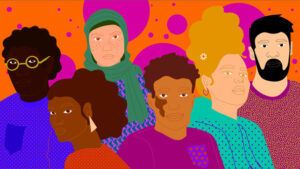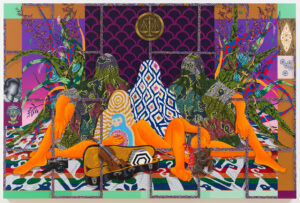Land Acknowledgement
I want to acknowledge the land that I reside on in Cincinnati, Ohio is stolen land from the Shawnee and Myaamia (Miami) peoples, who continue to live on this land today. I recognize the long history of systemic oppression of Indigenous peoples that continues to this day, including the removal of Indigenous peoples from the Ohio region. I know that my acknowledgement is not enough, it is only a step in the right direction. It does not undo the harm continues to be inflicted against Indigenous communities, their land, and water.
The Future of Equitable Funding in the Arts
More and more arts organizations are reckoning with their pasts in perpetuating systemic oppression of Black, Indigenous, and persons of color. As arts leaders that means investigating the inequitable systems that privileges White-led institutions. This starts with looking at how philanthropy contributes to inequity in the arts. According to a study by the Devos Institute at the University of Maryland, most arts organizations of color only receive about 5% of funds from individual donors. The rest of the funding comes from government and grant money, which is often only granted on an “as needed basis.” Funding from individual donors often comes from long-term financial investments, which are essential to arts organizations wishing to make a long-term impact in their communities.
As artists and leaders we must think critically about what arts organizations we support. Do they support artists and communities of color? A trap we often fall into is assuming that an institution that hires a few BIPOC professionals is promoting systemic change. In her article “Allyship in Grantsmaking” Kim Tran refers to this as a form of tokenism “pointing toward the hiring or position of one marginalized person as a way of proving a commitment to inclusion while not structurally supporting their community’s equity.” This diverts valuable resources away from arts organizations committed to true equity.
It does not have to be this way. Organizations are demonstrating alternatives to traditional philanthropy. The Sustainable Economies Law Center provides legal resources to empower communities to establish cooperative resource-sharing models. Artswave is a funding engine for arts organizations in the Cincinnati region. Donors and foundations donate to ArtsWave, which distributes funds to arts organizations in the region through impact-based grants. Artadia makes grants to a pool of applicants that is over 50% female and 40% BIPOC artists. The application is free and finalists are compensated for their time even if they don’t receive a grant. Community leaders in Buffalo, New York came together to create the “FB Land Trust,” which aims to use city land to prevent displacement and make residence affordable for community members.
In order to ensure an equitable future for minority arts organizations, we need to raise our expectations as theatre-goers and patrons of the arts. We have power to hold disingenuous organizations accountable to true equity. We have a responsibility to ensure a future of BIPOC artists and arts organizations.

Illustration by French Artist Aurelia Durand https://www.aurelia-studio.com/

Amir H. Fallah, Scales of Justice (2019), 2020 recipient of an Artadia award https://artadia.org/artist/amir-h-fallah/
Sources:
https://medium.com/justice-funders/philanthropy-will-not-save-us-a4de0ac596e2
https://www.locavesting.com/spotlight/balles-rodney-foxworth-wants-deepen-support-boundary-pushers/
https://www.theselc.org/mission
https://www.artswave.org/whats-artswave/what’s-artswave
https://www.giarts.org/article/allyship-arts-grantmaking

Suniti Nelson
She/Her/Hers
DSF Internship Participant
M.A., M.B.A. in Arts Administration
University of Cincinnati College-Conservatory of Music